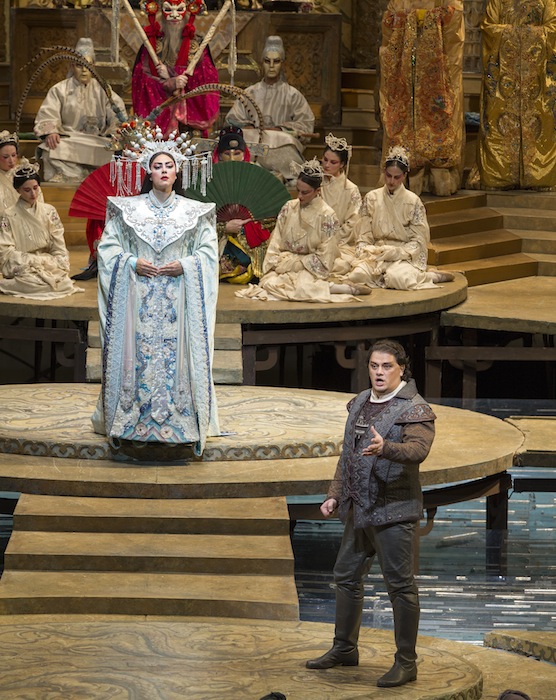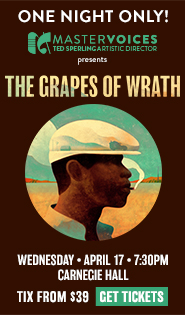After a slow start, bracing vocalism carries Met’s sumptuous “Turandot”

Oksana Dyka in the title role and Aleksandrs Antonenko as Calaf in Puccini’s “Turandot” at the Metropolitan Opera. Photo: Marty Sohl
No one would accuse Turandot of subtlety. Where Puccini’s other masterworks give vivid, probing portrayals of characters who seem immediately familiar, his final, unfinished opera is grand and exotic, its protagonists pulled from the pages of legend.
The revival that opened at the Metropolitan Opera Thursday was rough out of the gate, but in the end the performances of the leads were enough for the piece to achieve its magical effect.
The famous title character is full of contradictions—a fierce and fearsome Chinese princess, for whose hand countless wooers have perished. Turandot must be a commanding presence, both magnetic and imposing. Yet when the stranger, Prince Calaf, finally solves her fatal riddles, the role demands vulnerability, asking the previously dauntless soprano to show her terror at the prospect of being forced to marry a man she does not know and does not love.
Like many who have gone before her, the Ukrainian soprano Oksana Dyka is more successful in the make-the-nations-tremble side of the role. Her piercing high register was matched in Thursday’s premiere with a steely presence. Both are essential elements in the big Act II aria “In questa reggia,” which was genuinely intimidating, her focused, icy voice sharpening the hard edges of the music.
Dyka did manage to soften her voice somewhat in her frightened plea to her father and later in her Act III duet with Calaf, but her character remained just as stiff. Some of that is the fault of the staging; Franco Zeffirelli’s 1987 production misses no opportunity for grand spectacle, blowing everything up to epic proportion. On that scale, it becomes harder to portray the nuances of the characters and, even more so, of the intimate moments between them. The most arresting exchanges between the lead couple were in their public encounters: the confrontation between Dyka’s Turandot and Aleksandrs Antonenko’s Calaf in the searing riddle scene was like a meeting of liquid nitrogen and molten bronze.
Antonenko, for his part, gave a fine performance as the mysterious prince, unshakably stoic in a role that is dramatically straightforward but features plenty of memorable music. Oddly for a tenor with such a brawny instrument, he had virtually no bottom at all in Thursday’s performance, but his reflective, brassy top was in excellent form. He matched Dyka’s searing fervor in the riddle scene and impressed with his big, brash rendition of “Nessun dorma.” Antonenko, too, was a little hampered by stage direction, which had him inexplicably lying down on the stairs during the opening bars of the touchstone aria, when he clearly wanted nothing more than to run center stage and proclaim his resolve all the way out to Columbus Avenue.
Maria Agresta added a third role to her Met repertoire, playing Liù for the first time in Thursday’s premiere. Hers was the most fully formed dramatic performance of the principals, bringing an arresting intensity to her death scene. Vocally, she struggled to fill out the lyrical possibilities of the role: she showed little depth in her lower register, and in the first of her two arias, Act I’s “Signore, ascolta,” she seemed merely to be corralling her voice into the music, producing a consistent tone with ample weight, but not much nuance in her phrasing.
In his 999th performance with the company, James Morris showed he still has much to offer on the stage. His voice, an oaky bass-baritone wizened by years, is a fine match for the role of Calaf’s aged father, Timur, played by Morris with quiet dignity until finally overwhelmed with grief at Liù’s death.
The scene for Ping, Pang, and Pong that starts off Act II features some lovely writing, but one doesn’t necessarily expect it to be a standout. Thursday’s actors gave a genuinely touching account of the “Ho una casa” trio: Alexey Lavrov was something of a luxury as Ping, with his gorgeous, robust, liquid baritone. Company stalwart Eduardo Valdes showed a fine, reed-like tenor as Pong, while Tony Stevenson’s Pang offered a brighter, more buttery sound. Ronald Naldi betrayed a slight hint of weariness as the hoary Emperor Altoum, and Jeongcheol Cha showed off a booming bass-baritone as the Mandarin.
Carlo Rizzi got off to a slow start in his reading of the score, as did the entire opera as a result. Much of the first act felt dreary, failing to match the elaborate pageantry unfolding onstage, and often threatening to come apart. He found his mooring in the second act, and from there led a sumptuous performance overflowing with keen dramatic touches, from the icy blasts of the riddle sequence to the swelling romanticism of the “Nessun dorma” theme. The Met chorus was in glorious voice, nowhere sounding more radiant than in their fervent adulation for the Emperor.
Turandot runs through April 5 at the Metropolitan Opera. Hei-Kyung Hong sings the role of Liù on November 16. A second cast, conducted by Marco Armiliato and starring Martina Serafin, Guanqun Yu, and Marcelo Álvarez, opens on March 21. metopera.org



